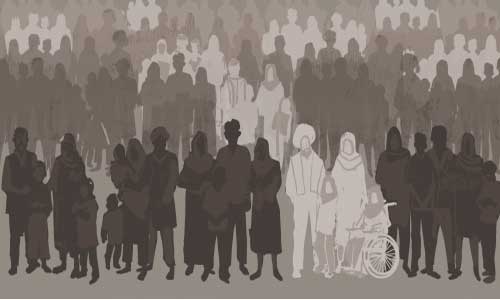Despite ambiguities in definition or concept of civil society, it is possible to draw out a general picture from the current political literature about its importance, functions and probable vulnerabilities. The civil society has a very high place in modern political discourse. It refers to a politically free and collective environment in which the member of civil society bridge between government and people. It transfers public demands or messages to the government and vice versa. In general, it plays important role in government decision making, mobilizing people, and directing people during election, act as watchdog for observing human rights and more importantly raise awareness in a democratic society. This way, civil society actors can enhance the participation of communities in the provision of services and in policy decision-making.
In the other word, civil society is the social relations area but government is political relations area. Government is trying to control or limit process or political actions by drawing political boundaries but civil society seek accountable government which respects the citizen’s rights.
The civil society is the most important mechanism for process of democratization, pluralism and public participation in politics ensuring balanced development within a country. Political participation is better possible through civic institutions keeping people active in the political arena. Thus, in fact, civil institutions have a dual function; On the one hand, they bring politics into the context of the people and make it popular, and on the other hand, they make the people political.
It is largely believed that civil society can pave the way for human approximation, participation and social supports acting as a barrier against individualism and dictatorship of the states. Accordingly, it has widely accepted that it ensure human freedom as it can control the government while the lack of civil society can led to ungovernable government. Therefore, the civil society is considered as sign of pluralistic and non-centralized government. Overall, it is largely believed that civil society, in addition to social or political role, it plays important role in economic and democratization growth. However, it does not seem absolutely true in some countries such as economic miracle in China, South Korea and Taiwan seeing that before growth of democracy, the economic miracle in those countries, especially in South Korea, was repressed by the ruling labor class.
Anyway, civil society is a new phenomenon in Afghanistan which came to existence after historic Bon Conference. Therefore, it is still considered a young phenomenon not completely recognized in the country. For example some Afghan people and even some educated people have negative mentality about it thinking it has been exported from western countries and any exported things have destructive aspect while other do not think so. In fact, the first category of people does not think that no country is entirely self-sufficient theoretically or materialistically. If we ignore every exported thing, we should also ignore using new facilities or technological products and also avoid using advanced political mechanism devised by foreign scholars. Instead of black and white mentality or having foreigner-phobia approach, we can use its positive aspects thinking that all human are from the same extended family playing expletory role in political and economic development of the globe. However, expecting foreigners to develop our country is also naivety.
The next challenge of civil society is presence of its enemies in Afghanistan. The enemies of civil society are the same enemies of democracy, advancement and pluralism. War, extremism, terrorism, ethnocentrism, ignorance, poverty and ethnocentric political culture can be named as enemies of civil society. If we look back in recent pasts, hundreds of civil society members were martyred by the mentioned elements. Even in recent weeks and months we have lost some active member of civil society in Afghanistan. Therefore, the government of Afghanistan is responsible to ensure the security of citizens including civil society members, media workders and scholars.
As a last challenge of civil society point finger to its weakness which also gave pretext to the enemies of civil society and democracy to be targeted. For example, the civil society is blamed for being tools for policy or not being self raised or independent. Accordingly, the activities of civil society is not methodic and nor coordinated in the country. It is often seen that they pursue project based programs fighting for personal interests or engaged in symbolic programs. In fact, some of the civil society activists misuse from name and institutions of civil society pursuing their personal, economic or political interests. In general, the civil society groups could not play its expected role in the country mobilizing people in line with national goals and interests.
Therefore, the civil society needs to make some fundamental changes and reforms. Firstly, the real role and position of civil society must be re-recognized and re-introduced in the country. Because the civil society is a new phenomenon in the country and majority of people are not familiar with its role and function in the country. Even when some of the civil society members when appear in the public media they express unscientific and baseless views. This show that majority of people including some of civil society members are not aware about role and function of civil society. Basically, the civil society members should increase their knowledge and then train people through public media about its role, functions, importance on political development. Secondly, the civil society should SWOT analyze their strength and weaknesses and then improve its management and coordination in the country. Otherwise, the output of a weak civil society will be a weak democracy as we see in the country.
Home » Opinion » Civil Society and Its Challenges in Afghanistan
Civil Society and Its Challenges in Afghanistan
| Mohammad Zahir Akbari

